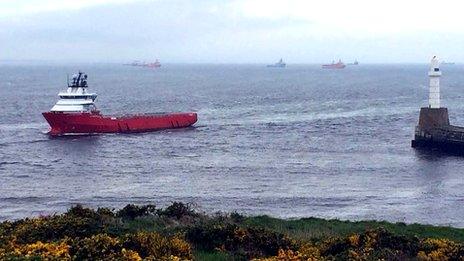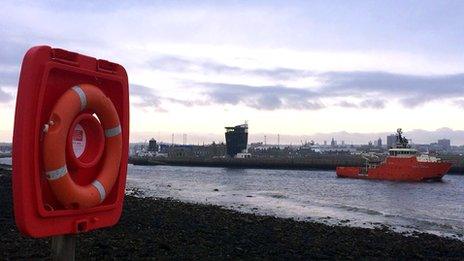Scottish independence: The 'Scottish anomaly of Aberdeen'
- Published

The oil industry makes Aberdeen multi-cultural
In the week campaigning begins for the Scottish independence referendum, BBC Breakfast has taken to the road to look at the economics at the heart of the debate.
In part two they were in Aberdeen to assess the future of Scotland's famous energy industry.
By 7am, the helicopter hangar at Aberdeen International Airport is filled with 120 decibels of whirring rotors.
We joined Canadian firm CHC, which runs more than 20 choppers that take oil and gas industry workers to and from rigs out in the North Sea.
They are one of three firms running out of the Dyce airstrip - and they alone run more than 40 flights a day, carrying more than 600 passengers between the mainland and offshore drilling platforms.
It is a huge operation, and illustrative of just how much growth is coming from this part of Scotland.
Aberdeen is an anomaly - it is Scotland's London - creating more growth and attracting more people than any other region in the country.
Ian Williams, chairman of accountancy firm Campbell Dallas, is a specialist in the region's economy.
"Aberdeen produces 28% of Scottish GDP but only 4% of Scottish population - so it's punching above its weight," he said.
"And in that respect it is not dissimilar to London - in fact it is doing better than London if you consider that contribution to the economy."
You can see this impact in the escalating house prices or the bumper-to-bumper traffic jams on the roads each morning.

The Scottish government says 90% of UK oil and gas reserves are in Scottish waters
One worker told me when he coached his son's football team, only three of the children on the pitch were Scottish. The oil industry makes Aberdeen incredibly multi-cultural and vibrant.
The future of the energy businesses here are under fierce scrutiny in the run-up to the referendum.
The Scottish government says that 90% of the UK's oil and gas reserves are in Scottish waters - and predict the value of reserves could be worth a whopping £1 trillion.
Government incomes from oil and gas revenues fluctuate with the wholesale prices and, in the last month, the Office for Budget Responsibility has lowered its prediction for revenues in 2016/17 from between £4.2bn and £10.7bn - down to between £2.9bn to £7.8bn.
That is cash either side of the independence debate are banking on, but figures they cannot entirely rely upon.
Big lure
But it is about the people too.
Industry body Oil and Gas UK estimates about 450,000 people are employed in the sector - almost half of whom are based in Scotland.
Those jobs are a big lure - they bring skills and talent, drive consumer spending, help fuel a buoyant housing market.
The ripples from the energy sector can be felt across the region. Last year a record number of people travelled offshore for work - almost 62,000. About 80% of those were British. Only 3% were women.
One company heavily involved in the sector is Wood Group PSN.
Chief executive Robin Watson said that investment in the industry remained high, in spite of challenges.

The oil industry employs people the length of the east coast
But as a business, although growth here in Scotland was good, an increasing amount of potential was coming from overseas.
He also felt that the skills gap in the UK meant the company had to spread more of their opportunities across the country, not just in north east Scotland.
He said: "Our operations here in Scotland are not dissimilar to what we're doing in England too.
"We employ 7,000 people right from Shetland all the way down to the north coast of Norfolk," he said.
This idea of diversification is very much the future for Scotland - and indeed the UK's energy future.
Last year Scotland managed to generate almost half its electricity from renewable sources, and is working to hit a target of 100% by 2020. It is already home to 25% of Europe's wind and tidal power and investment in this area is rising.
'Huge uncertainty'
Niall Stewart, chief executive of Scottish Renewables, has called for £1bn investment in hydroelectric power in the country, something he argues will be valuable to future energy security.
"There's a huge amount of uncertainty about the future investment in renewable energy," he said.
Whether it is oil, gas, tidal or wave, Scotland will want to remain a dominant force in Europe's energy supply chain.
And to get all the revenue they want from the sector will mean maintaining these investment levels and continuing to attract workers from across the globe.
On Wednesday's programme, BBC Breakfast will be in Peterhead, looking at food and drink exports.